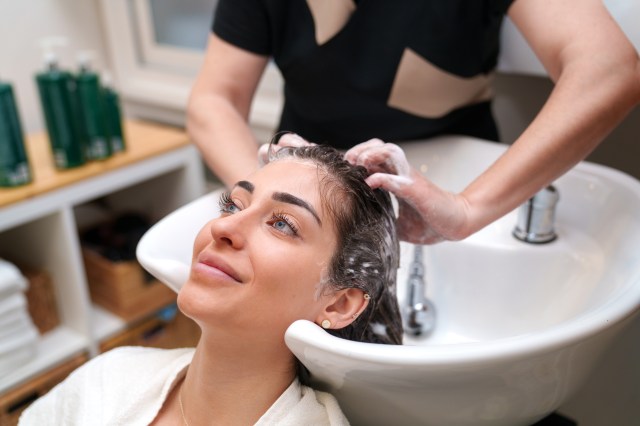How Hair Professionals Can Better Serve Clients Affected by Cancer

Hair professionals run the gamut as stylists, therapists and beyond in an exceedingly trusted role, and this is true for clients affected by cancer. Nicole Petty of Milk & Blush shares her insights on how to accommodate these clients with compassion and care.
Understand
“Treatment can hugely impact the overall appearance of a person’s hair and scalp which can deeply affect self and emotional wellbeing,” Nicole said. “Studies show that an estimated 65 percent of patients will experience hair loss during chemotherapy treatment, with effects ranging from patchy thinning to total hair loss.”
“This can leave clients feeling self-conscious and vulnerable, especially as regrowth can be slowed and changes in texture, colour and thickness are not uncommon. This is often called ‘chemo curls,’ as the treatment can cause hair follicles to change and lead to twisting and curling hair growth.”
Nicole also says to be sensitive around side effects of scalp sensitivity, dryness and irritation, where hairdressers must acknowledge these challenges to provide support.
Make your space comfortable
“Salons should be a sanctuary where clients feel at ease and supported, and building this atmosphere starts with thorough training. Stylists should receive professional training to understand the effects of cancer treatments on the hair and scalp through dedicated oncology haircare sessions. These will equip staff with the knowledge and empathy necessary to approach appointments with care,” Nicole said.
Ensure you approach all conversations with empathy and professionalism, making your salon a safe space.
“Ask permission before you touch a client’s scalp or discuss any observations to respect any boundaries,” Nicole said. “Privacy can be a major concern, especially for clients who may be in the early stages of treatment-triggered hair loss and may feel understandably self-conscious. Offering private rooms, discreet screened-off areas or out-of-hours appointments can help customers feel more at ease.”
Be cautious with products
“Scalp sensitivity and hair growth need to be prioritised after finishing cancer treatment, so stylists must ensure any products are hypoallergenic, fragrance-free and don’t contain harsh chemicals,” Nicole shared. “To protect and support regrowth, avoid products containing sulphates that can irritate sensitive scalps, and alcohol-based formulas should be sidestepped to avoid drying out strands and the scalp.”
Nicole also warns against harsh chemical colours and says to opt for nourishing ingredients such as jojoba, glycerin, aloe vera and shea butter.
Tailor your services
“Extending services to include patient-friendly offerings like wig support can have a significant impact on client trust and confidence,” Nicole explained. “Wig and hair extension expertise can offer a solution to clients wanting to feel empowered while feeling more like themselves, as a well-fitted and suitable wig can restore a sense of normality and boost self-esteem in an otherwise challenging time.”
Nicole also encourages gentle massage and basin services to account for scalp sensitivity, as well as personalised cut and style consultations and even education around tying and styling headscarves in the face of hair loss.
Help clients spot the signs
“Observing changes in clients’ hair can potentially save a life. The condition of your hair and scalp can serve as an indicator of any underlying health conditions,” Nicole shared. “While it’s not your responsibility to diagnose conditions, flagging any concerns with care and recommending getting a professional medical opinion can demonstrate your commitment to client wellbeing.”
“Some signs that should be discreetly flagged to a client can include lumps, sores and discolouration. Changes to hair texture should also be highlighted, such as brittleness or thinning, as this may be a sign of internal health issues. Raising these observations compassionately can ensure clients seek medical advice when necessary.”
For more information visit www.milkandblush.com
